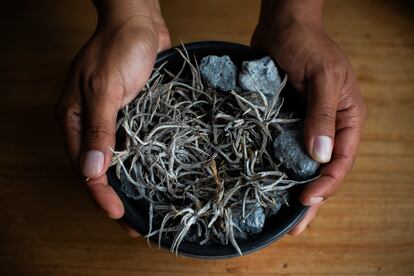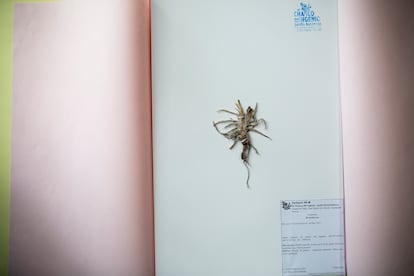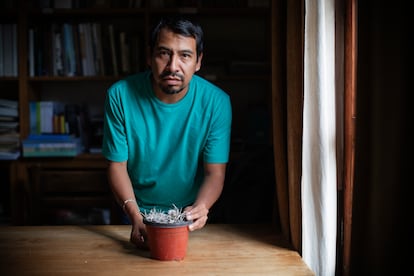Mexico offers a new plant to the world
Discovered in a botanical garden, the ‘Viridantha minuscula’ is an example of the country’s enormous variety of species


A brand-new plant, unseen anywhere else in the world, has just been discovered in Mexico. What makes it even more fascinating is that it remained hidden for 32 years in a place regularly visited by expert scientists. Biologist José Viccon discovered it while strolling through the lovely Charco del Ingenio, a botanical garden in San Miguel Allende, Guanajuato (central Mexico). It’s a small bromeliad, belonging to the same plant family commonly used to decorate homes and gardens, one that includes pineapples. Its scientific name is Viridantha minuscula, but it will now be known as the Charco bromeliad. Biologists typically refrain from naming a new species after its discoverer, Viccon told EL PAÍS. After reviewing the scientific literature and consulting experts, the discovery was approved by the Phytotaxa journal.

“Viccon was out exploring the ravine when he stumbled upon this interesting specimen. It took months for the plant to bloom, and only then could he confirm its unique characteristics. He called his colleagues to come and check it out, but none of them were entirely certain. Finally, months later, the Phytotaxa journal congratulated us on our discovery!” said Mario Hernández, the director of the botanical garden nestled in one of the most beautiful and popular tourist towns in Mexico. San Miguel Allende has a semidesert climate and its Charco del Ingenio botanical garden is dedicated to preserving and showcasing species native to this habitat, which is ideal for cacti and other varieties that thrive with little water.
The bromeliad’s flower is surrounded by a calyx of small sword-shaped petals, resembling the crown of a pineapple. The pinkish color resembles other members of its plant family commonly found in homes. Viccon, an expert in bromeliads, orchids, ferns, peperomias and aroids, has often written about these popular species. “Bromeliads are found in various parts of the American tropics, but this particular one from Guanajuato is a rock-dweller that’s well-suited for arid climates,” said Viccon. This newly discovered plant is tough, with roots that cling to rocks and needing only minimal rainfall to survive. “They have the characteristic greenish-gray color and trichomes, those tiny hairs that soak up any moisture around them,” said Viccon, who has been pursuing this specimen since arriving at Charco del Ingenio four years ago. “Discovering a unique species isn’t easy, especially in a place that’s been thoroughly studied for 32 years. It was quite a challenge.”

The stem of the Viridantha minuscula can grow up to three inches (seven to eight centimeters) in diameter. The flowers are relatively large compared to its size, greenish-yellow, and enclosed in small, rosy spathes that a casual observer might mistake as separate flowers. It is not edible, but it does produce fruits and seeds like other plants. This dwarf bromeliad grows only about two inches (five centimeters) high.
It is not rare to come across new plant discoveries. Many biologists devote themselves to searching for new species or simply to thoroughly document a region’s flora. Nature is constantly evolving, and both human activities and climate can lead to changes and adaptations that give rise to new species. The Charco bromeliad is a prime example of this. “A considerable proportion of Guanajuato’s flora has been neglected due to human practices causing habitat destruction. However, the state has immense unexplored potential. This remarkable discovery represents a significant accomplishment within a heavily modified environment, and like all others, it’s susceptible to the impacts of climate change. The presence of a newfound species should prompt us to contemplate the conservation of our natural resources and the need for appropriate public policies,” said Hernández. Every five years, biologists divide the area into quadrants or transects to meticulously inventory all the plants and send that information to a central repository at Mexico’s National Institute of Ecology (INECOL) in Michoacán (western Mexico).
The botanical inventory is a way of observing how a natural space is transformed over time. “While we’re constantly discovering new plant species around the world, it’s heartbreaking to see many more go extinct. Adaptations usually take millions of years, but because we’re changing the planet so rapidly, these plants don’t have enough time to adapt,” said Hernández. Mexico is a fertile ground for the discovery of new species due to its enormous climatic and natural diversity. Mexico and six other countries account for 70% of global biodiversity. “There’s a whole world out there waiting to be discovered,” said Hernández.
Sign up for our weekly newsletter to get more English-language news coverage from EL PAÍS USA Edition
Tu suscripción se está usando en otro dispositivo
¿Quieres añadir otro usuario a tu suscripción?
Si continúas leyendo en este dispositivo, no se podrá leer en el otro.
FlechaTu suscripción se está usando en otro dispositivo y solo puedes acceder a EL PAÍS desde un dispositivo a la vez.
Si quieres compartir tu cuenta, cambia tu suscripción a la modalidad Premium, así podrás añadir otro usuario. Cada uno accederá con su propia cuenta de email, lo que os permitirá personalizar vuestra experiencia en EL PAÍS.
¿Tienes una suscripción de empresa? Accede aquí para contratar más cuentas.
En el caso de no saber quién está usando tu cuenta, te recomendamos cambiar tu contraseña aquí.
Si decides continuar compartiendo tu cuenta, este mensaje se mostrará en tu dispositivo y en el de la otra persona que está usando tu cuenta de forma indefinida, afectando a tu experiencia de lectura. Puedes consultar aquí los términos y condiciones de la suscripción digital.








































